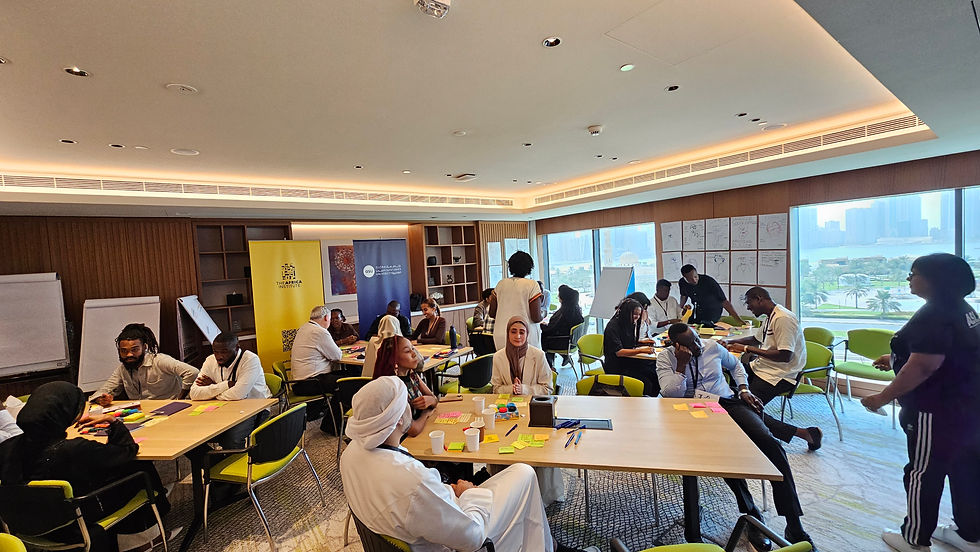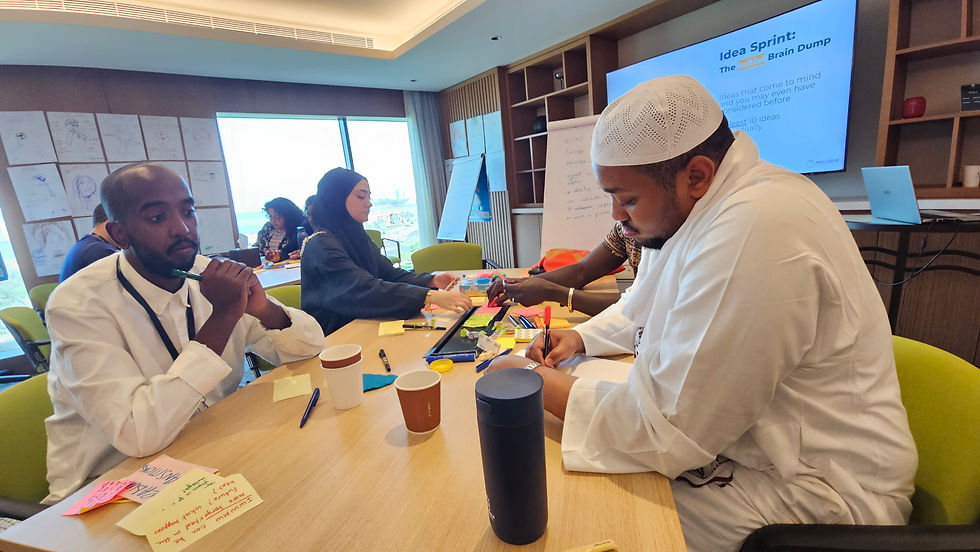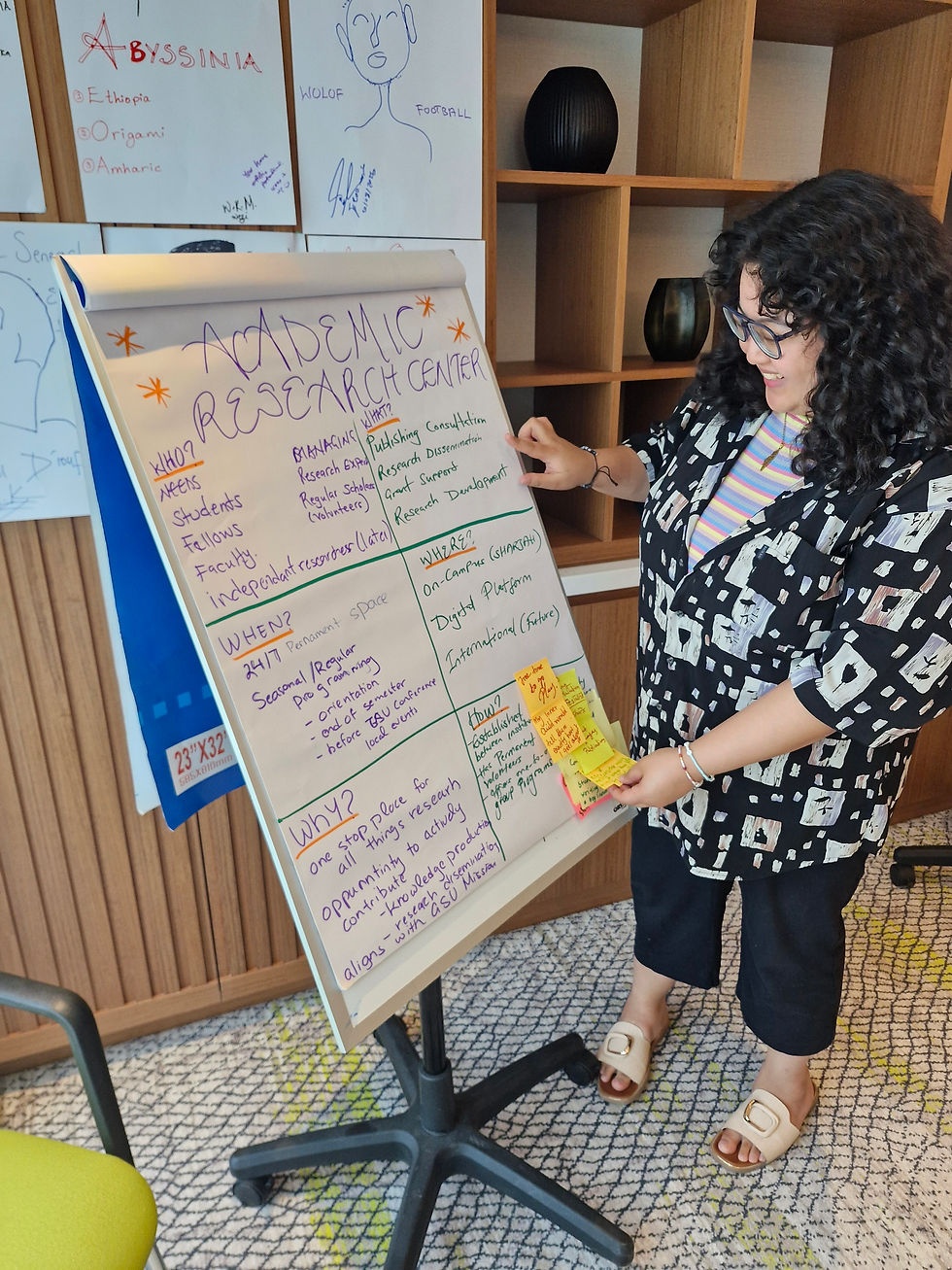Building Community and Confidence: Orientation for MA and PhD Students at The Africa Institute
- Sep 9, 2025
- 3 min read
On 20–21 August 2025, we facilitated a two-day orientation workshop for the first cohort of 24 MA and 12 PhD students at The Africa Institute, Global Studies University in Sharjah, Dubai. Students came from across Africa and the UAE, and most had minimal prior interaction with one another. Our aim was simple yet ambitious: to help every participant leave the workshop feeling more connected, confident, and ready to engage in the Institute’s academic and cultural community.

Guided by our principles of inclusion, intentionality, creativity, collaboration, and investment in participants’ growth, the workshop became a space for peer connection, cultural exploration, and collaborative problem-solving.
Setting the Stage: Intentional Preparation
Before the workshop began, we joined the cultural orientation and welcome on 19 August with Chancellor Prof. Salah M. Hassan and Dean Prof. Binyam S. Mendisu. This gave us insight into the Institute’s vision, mission, and cultural expectations, which informed how we designed the two days.
We wanted to ensure the workshop:
Fostered connections across different levels of study.
Provided opportunities for students to explore and articulate their hopes, concerns, and aspirations.
Encouraged collaboration and creative thinking.
Celebrated cultural diversity and used it as a resource for problem-solving.
We were thrilled to receive this client feedback:
“The sessions unfolded beautifully and concluded in such a way that they left a lasting impact. Our students now carry with them a clearer understanding of GSU’s vision and mission, and, most importantly, a stronger sense of belonging to our community as students, future scholars, and potential leaders in their chosen fields.” - Sara Madji, Director of Student Affairs
Day 1: Creativity, Connection, and Cultural Awareness
We began with coffee and registration, inviting students to design their own name tags with rainbow markers and the name they preferred to be called as a small creative act to set the tone for openness and playfulness.
Students engaged in interactive “getting to know your peers” activities, including blind portrait drawing exercises in trios and pairs. These exercises were playful yet meaningful: students connected through humor, curiosity, and reflection. Later, group discussions explored their hopes and concerns in the context of the Institute’s vision and mission.

The day concluded with reflection on cultural diversity in problem-solving and clarifying the challenges and opportunities of the academic journey ahead. One participant reflected:
“The part where we had to do different activities with our peers… helped us build a good relation and understanding.
Day 2: Deepening Connections and Creative Problem-Solving
Day 2 opened with greetings in students’ mother tongues, accompanied by translations and explanations of cultural meanings. This created a moment of shared cultural appreciation and respect.
Students then participated in structured ideation exercises, including idea sprints, forced connections using images, and mind-mapping guided by the 5 Ws and 1 H (Who, What, When, Where, Why, and How) tool. Activities encouraged both creativity and analytical thinking.

The afternoon included a provocation by Prof Grieve Chelwa on “Graduate Studies in an Era of AI”, sparking curiosity and debate, followed by exercises in collective and personal visioning. Storyboarding exercises like “My Africa Institute Journey” and destiny/path cards invited students to reflect on their personal and academic trajectories. These exercises prompted emotion, empathy, and insight, with one student sharing:
“The storyboarding activities truly impacted my personal motivation and reflection towards my own personal and academic trajectory and evoked emotion and empathy to understand my peers and myself.”
Outcomes: Connection, Confidence, and Creativity
By the end of the workshop, students had built meaningful relationships across MA and PhD levels and developed awareness of cultural identities and shared values. They also left with an understanding of collaborative problem-solving and ideation. The students explored the impact of AI on their graduate studies as they begin their journey and reflected on personal and academic goals and trajectories.
Participant feedback reflected the value of these outcomes:
“Group work. I loved all of it to be honest. It was a great collaborative experience.”
“Self-discovery and AI discussions were very important and related to my future work.”
“Focused work activity and discussion… helped to meet new participants and collaborate on aims and solutions.”
Our reflections as facilitators
Facilitating this workshop reinforced a few key lessons for us:
Preparation is essential. Understanding the Institute’s vision and cultural context helped us tailor activities meaningfully.
Play and creativity foster connection. Simple, fun exercises created openness and trust.
Depth over breadth matters. Participants appreciated deeper engagement over numerous transitions.
Shared reflection strengthens community. Storytelling and personal reflection activities fostered empathy and understanding among peers.
At Inclusive Innovation, we see orientation as more than an introduction; it is an opportunity to build relationships, spark curiosity, and lay the foundation for a thriving academic community. By the close of this workshop, students were not only familiar with one another, they were connected, inspired, and ready to embark on their academic journey together.




Comments